OptCrops - Interview with social entrepreneurs Sunandan Sarkar and Limbaroyati
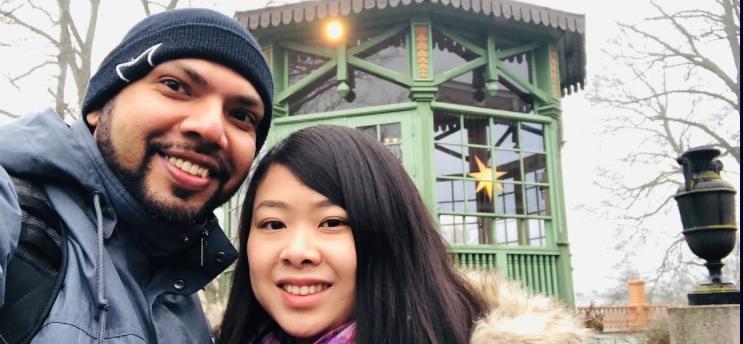
Sunandan and Limbaroyati is a couple from Bangladesh and Indonesia living and studying in Estonia. Sunandan just graduated from Tallinn University where he studied social entrepreneurship while Limbaroyati studies in the Digital Learning Games MA program. They developed OptCrops an application that supports smallholder farmers in Bangladesh.
Can you please introduce yourself shortly?
Sunandan: Hello, my name is Sunandan Sarkar, and I’m a fresh graduate of the Social Entrepreneurship MA program. I have been living in Tallinn and pursuing my master’s study since 2018.
These two years of adventure in Estonia has taught many life lessons and equipped me with not only academic knowledge but also life experiences, providing a new, practical and digital perspective on the world in which we live. Besides, the crucial factors that guided me throughout the journey are Motivation, Perseverance, Adaptability, Leadership and Unwavering willingness. However, after graduating from Tallinn University, I feel more confident, curious & responsible and want to contribute my knowledge and skills to the community in a functional manner.
Limbaroyati: Hi my name is Limbaroyati, I’m a freelance designer, I enjoy making some art works. My works includes UI/UX design, Logo design, Animation, Illustration, and Game design. Currently, pursuing my master in Digital Learning Games at Tallinn University.
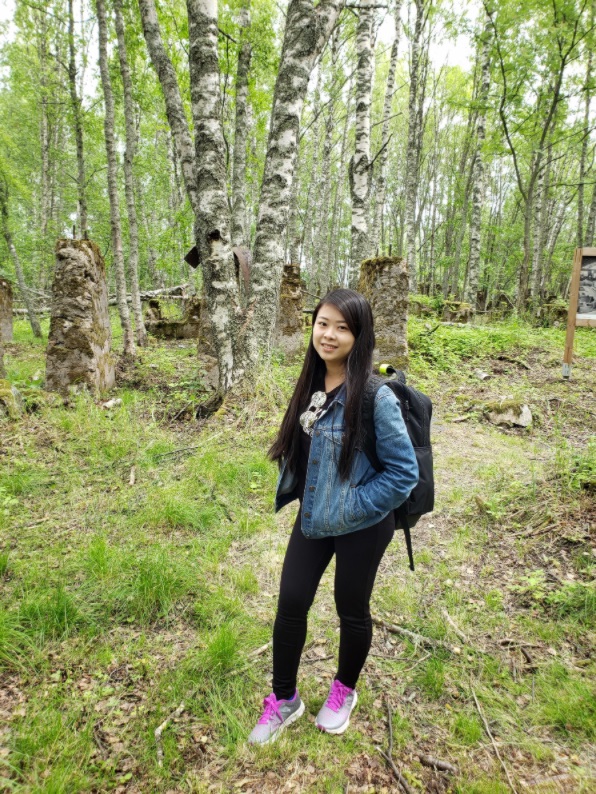
Limbaroyati
What brought you to Estonia?
Limbaroyati: Well, we’d like to explore and experience something different in some part of the world and we found out Estonia might be best for both of us. Since we both found courses that we like. Also, the country seems very interesting. So, we just pack the bag and fly here.
Sunandan: My ambition to study in Estonia stems from its transparency, e-residency, digital society and startup environment. After checking information available online, it was evident that a business can be established here in a fast & efficient manner.
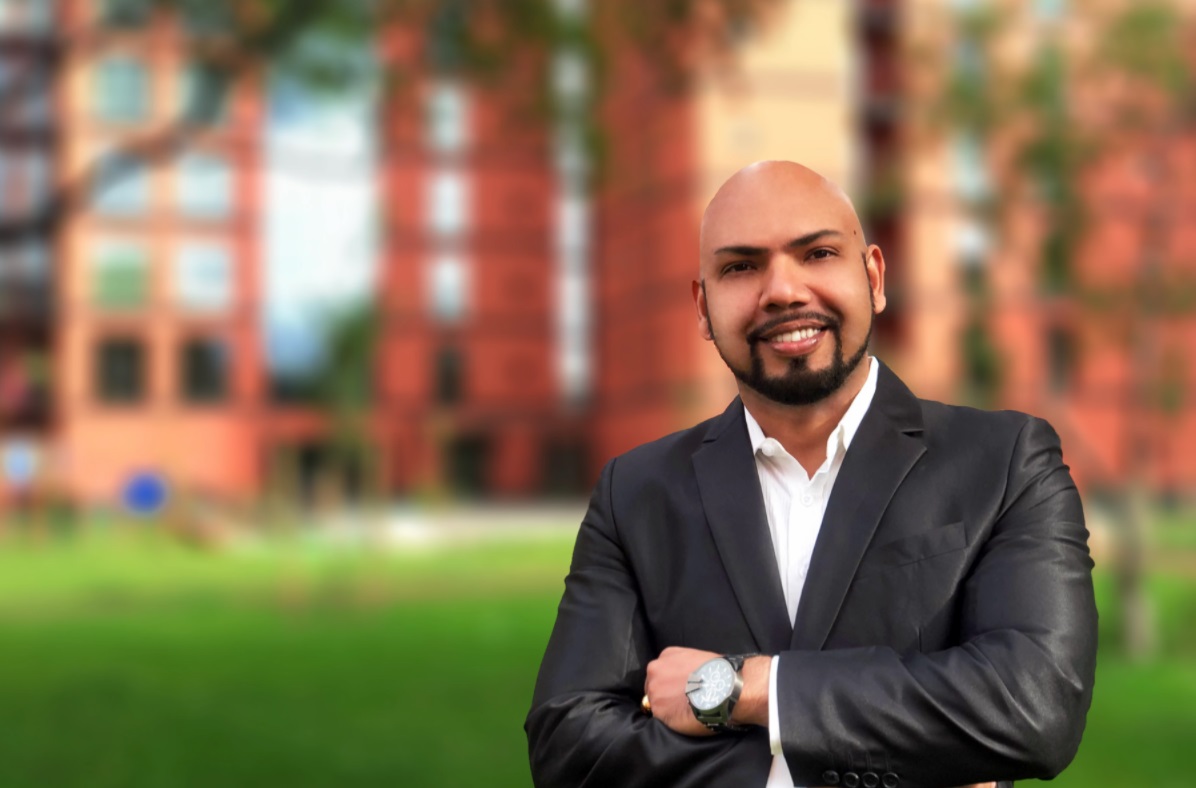
Sunandan
Estonia’s supportive, enthusiastic and open startup ecosystem allow ambitious individuals and teams to develop ideas into a tangible product. The lucrative project- based Master’s program, Social Entrepreneurship (SEMA), offered by Tallinn University, was a life-changing opportunity that I have been looking for all the while. I realized that Estonia would be a perfect ground to build the next move in my professional career. Hence, my keen interest to learn about social entrepreneurship and setting up my business that has a positive impact in the society brought me here.
Sunandan, you just graduated from Tallinn University’s social entrepreneurship MA program submitting an excellent project thesis. Can you please share with us what is your project about?
Sunandan: Thank you so much for your compliment. I’m thrilled, and this wouldn’t have been possible without my supervisor’s guidance and support. It is said that social entrepreneurs can see the way of connecting social and environmental resources into economic developments. I am glad to be part of an entrepreneurial community which has a significant impact on society. To propose creative business concepts utilizing digital tools and online platforms, the entrepreneurs are bridging gaps between business concepts and practicalities. As a social entrepreneur, when thinking about the rural community, the first thing that comes to my mind is agriculture and farming.
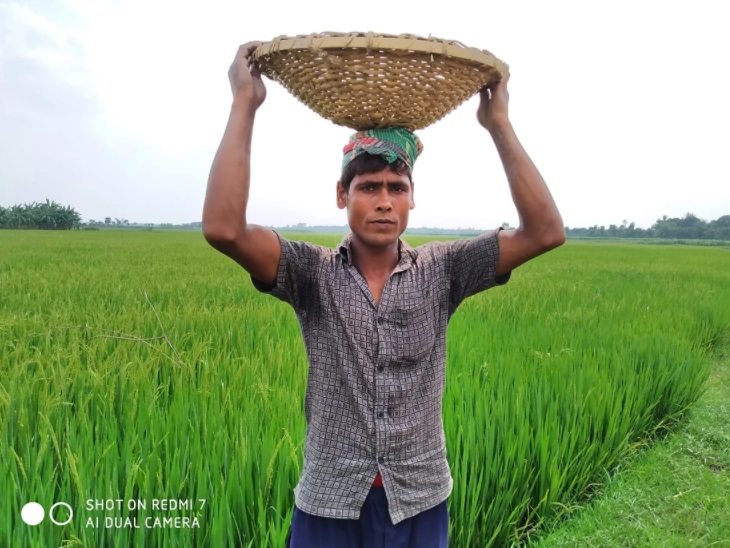
Farmer in Bangladesh
Well, I am working on a project aimed at empowering smallholder farmers in Bangladesh. The goal is to create a platform that generates sustainable rural economic growth while allowing smallholder farmers to access available scientific and practical farming information. To start with this concept, I had to conduct the initial research to emphatic understanding of the target audience.
Based on these findings, I realized that we have to design the prototype that is really simple, user-friendly, very intuitive to use, culturally appropriate and written in an easy-to-understand language. To build an optimal solution for the farmers who are going to use services on a daily basis, we followed design requirements to design and develop the final prototype.
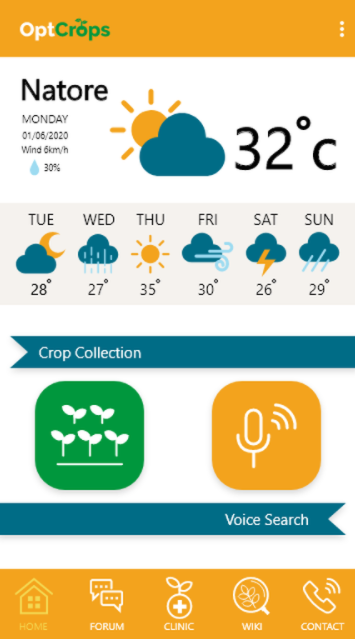
Finally, the designed services were tested on the end-user settings to detect the improvements, and we found mostly positive feedback from the target users. So, this is our story.
My wife, Limbaroyati, is a designer and a vital member of this project. Her role in thisproject development is to design the logo, icon, wireframe and the prototype. She has been my support system all along the journey, and I cannot express my gratitude in words for her contribution to this design work and also for believing in me.
Limbaroyati: We brainstorm and discuss together what might fit in the app before I designed the wireframe and the prototype.
Over the last two years, you were very active in Estonia and also in Finland working on your project idea. What did the SEMA program give to you that was relevant for you on your journey as a social entrepreneur?
Sunandan: There are several practical, and project-based learnings which were relevant in the journey of this project. During my study of SEMA program, intensive training courses in entrepreneurship, both concept and practice had been completed.
Business development models, Project management, Social entrepreneurship, ICT and Communication and PR were some of the core courses which lead me to go deeper in project-based learning. Which, in turn, has helped me to develop entrepreneurial skills by completing a few real-time projects.
Many practical tools were taught and used in these projects, such as Lean Business Model Canvas, One-pager, Value Proposition Canvas, Work Breakdown Structure (WBS), Monitoring quality & Managing risks and creation of financial statements, etc. By and large, this educational and practical training had given the supportive environment for idea development as well as laid the groundwork to set up my own business in future.
Furthermore, participating in various startup competitions and events in several Estonian cities were helpful to enhance the teamwork, public speaking skills as well as building the confidence to a greater extent. For that, the credits go to SEMA program.
What did Estonia give to you over the last two years? How do you see the differences between Estonia and Finland when it comes to the support of impact-oriented entrepreneurial work?
Sunandan: I would say, Estonia has given me many opportunities such as easy access to resources, free transportation and safety. In addition to this, Estonia is a high-tech digital society. In my project, many aspects of implementing agricultural technological innovations are involved, such as Software development, Voice Recognition, Speech Synthesis, and AI/ML (Future implementation).
This project is currently being developed in Tallinn, due to the perfect location with its fast & easy setting up business infrastructure, transparency, e-residency, digital society, and startup environments. Not to mention, social agripreneurship capacity in Estonia gives leverage to technological development and the entrepreneurial spirit of the digital culture, which is very realistic and essential for rural communities.
Tallinn is beautiful primate city and a cultural hub. Moreover, during my stay here, I have experienced with Estonian Song Festival (Laulupidu 2019) which was a masterpiece and an eventful festival. I am experiencing the Estonian culture like a local.
Besides, I have participated in many hackathons in Estonia, and one thing I discovered in all of those events is that the organizers provided excellent and experienced mentorship and guidance throughout the project completion. Anyway, in some cases, it was hard to find group members or someone willing to join startup related to social impacts.
Perhaps the social business is relatively unfamiliar with the young generation. But since last year, things have been changed a lot in Estonia. Now many social impacts related startup hackathons are happening here in Estonia. For instance, last year, Tallinn University SEMA and SEB bank in cooperation with JCI World Congress held the Digital Innovation Days. This hackathon was designed to embrace social business-related ideas to establish.
With regards to Finland, I would say it’s a pretty big country compared to Estonia. They are more supportive and welcoming towards social ideas. They make all efforts to provide mentorship to entrepreneurial enthusiasts. Finland has several NGOs, aiming to help people enhance their skills and train new skills so that they can reach the tech world by either launching a new startup or being a part of an established startup. Besides these provisions, they also offer free training provided by renowned mentors.
In terms of combined GDP per capita, social support, freedom and generosity, Finland has a higher score than other countries. Consequently, Finland is considered the happiest country in the world (2019), which undoubtedly helps foster innovation, creativity and entrepreneurship. As of 1st July 2019, the share capital requirement for Finnish enterprise is 0€, which makes it very easy to set up a company because there is no need to fly to Finland or pay for equity.
What are your plans guys? How do you continue after graduation?
Limbaroyati: We’d love to make this app comes to life. Of course, there are many things need to be done before hand, such as connecting with same mindset people to have bigger team, also seeking for angel investor. One at a time, until we reach our goal!
Sunandan: We would like to continue the development of our final prototype and at the same time, seek funding to get it running and established. Right now, we can catch up with the pace of development without losing the continuity. People are going through some tough time now because of the Pandemic. There are opportunities hidden in every situation. Our project is an apt solution for some of the problems faced by farmers these days. The time that I have now is to be put to good use in implementing this project.
Self-employment is becoming increasingly popular these days. Perhaps, by putting my entrepreneurial skills to test and becoming self-employed could be a smart move. I would like to explore more, experience different cultures and meet new people as well.
You can contact Sunandan on SEIP
And Limbaroyati here